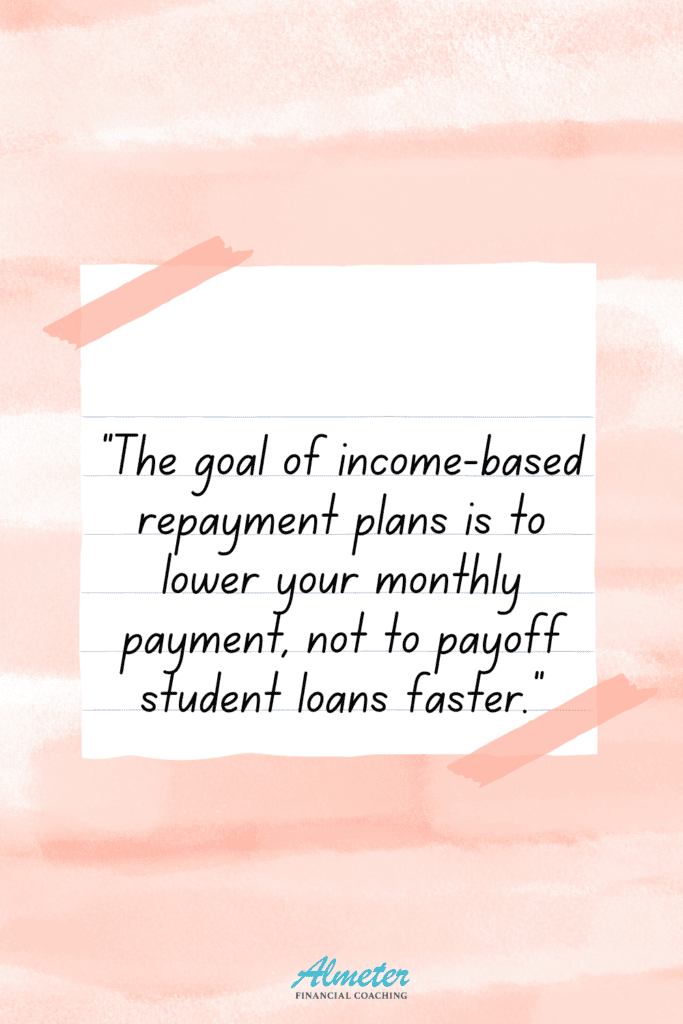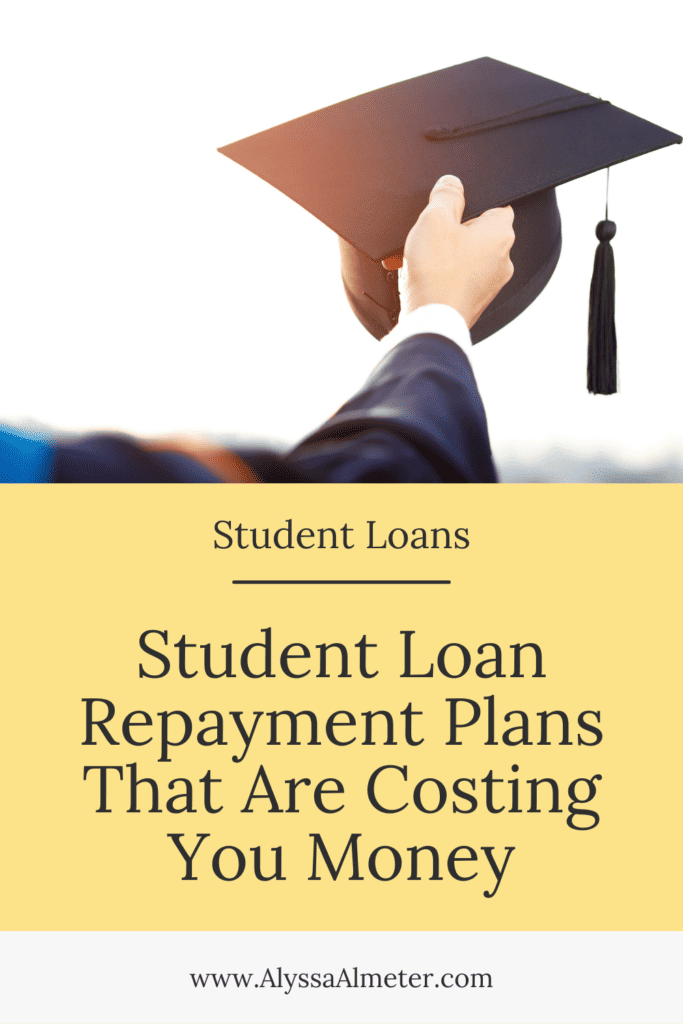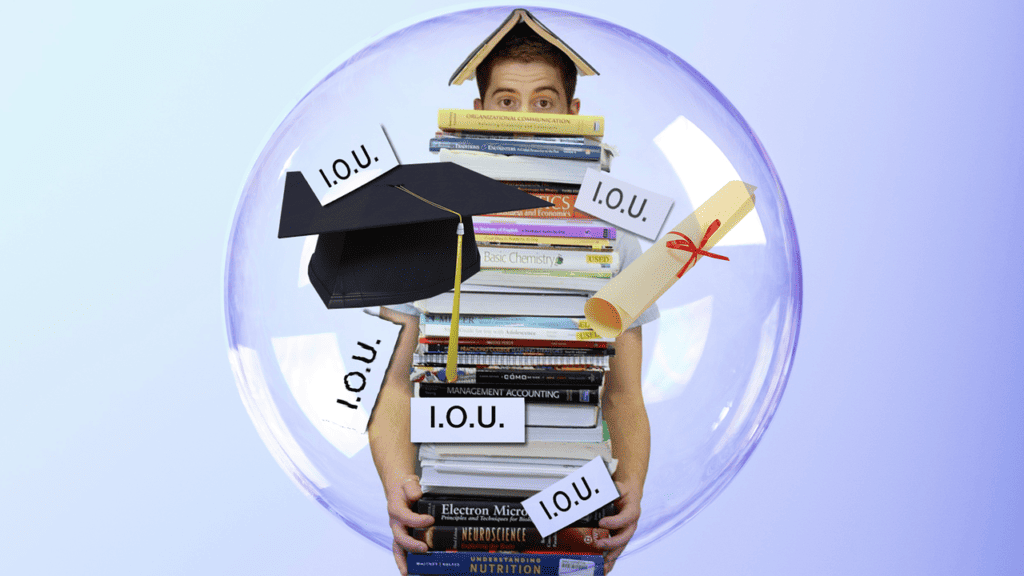These Student Loan Repayment Plans are Costing You More Money in the Long Run
There are a lot of different student loan repayment plans out there but the truth is that most of them are just a short term fix, not a long term solution. Short term fixes might sound good at the time but can end up costing you more money in the end and making the whole process a lot longer than it has to be.
So how do you know what a short term fix is vs. a long term solution?
In this post I’ll share the different federal student loan repayment plans, how they effect you and what your best solution is.
Income-Driven Repayment Plans (IDR Plan)
If your income is low in relation to your student loan debt, you may be eligible for an Income-Driven Repayment Plan. There are 4 different types of income-driven plans that are based on your income and family size.
These loans will lower your monthly payments, which will increase your repayment period. Your repayment period can extend up to 20-25 years instead of the 10 years under a standard repayment plan. When you extend your repayment period, you will end up paying more interest in the long run.
- Revised Pay as You Earn Payment Plan (REPAYE Plan)
(As of June 30, 2023, President Bide announced the new Saving on Valuable Education Plan (SAVE Plan), which will replace the REPAYE Plan. Visit the Federal Student Aid website for up to date information on the developments of the SAVE Plan.)
- Pay as You Earn Repayment Plan (PAYE Plan)
- Income Based Repayment Plan (IBR Plan)
- Income Contingent Repayment Plan (ICR Plan)

Public Service Loan Forgiveness
If you plan on or are currently working in public service you probably heard about the Public Service Loan Forgiveness (PSLF). It is a government program that will forgive your student loans under certain qualifications. But just because you work for public service that doesn’t mean you automatically qualify. What many people don’t realize is that there are extensive criteria that make you qualified for the program.
One of the criteria is you have to make 120 qualified payments before you can even apply. Translation – you have to not miss a payment on your student loans for 10 years before you can even apply for PSLF! Why wait 10 years in hopes of having your student loans forgiven when you can probably pay them off in less than half of that time with the right plan?
On top of that, even if you do qualify that does not guarantee your loans will be forgiven. As of June 2019, the Public Service Loan Forgiveness Program received 110,729 applications from 90,962 people. Only 1216 applications were approved and 845 of those were actually received loan forgiveness. So would you wait 10 years for a 0.7% chance that your loans will go away?
Deferment and Forbearance
Deferment and Forbearance temporarily stop or reduce your monthly federal student loan payments for a certain amount of time due to financial hardship. A financial hardship could include loss of job, or increased medical expenses.
With forbearance you are responsible for paying the interest that accrues during the time period you are in forbearance. That means you will end up paying more interest in the end.
With deferment you may not be responsible for the interest that accrues, but that depends on the type of loan.
Delinquency and Default
Delinquency and default are not actually types of student loan repayment plans. They are the consequences if you ignore your payment plan (missing payments). The day after you miss a payment your loan is considered delinquent and is considered delinquent until the past due amount is paid. If a payment is past due more than 90 days, it may be reported to the credit bureaus, which will be reflected on your credit report.
If time passes and a payment isn’t made on a delinquent loan it can go into default status. The timeframe of when this can happen varies on the types of loans. There are several consequences if your loan goes into default.
Consolidation
You are probably familiar with the term consolidation when it comes to your student loans. There are a lot of companies out there that advertise student loan consolidation. If you have a high interest rate you probably have considered consolidation. The truth is, consolidation does not guarantee a lower interest rate.
Consolidation bundles all your loans into one big loan. It won’t necessarily help you pay off your student loans any faster. So instead of having several “smaller” loans where you can focus on paying off one at a time, you have one big loan.
There are only 3 reasons why you should consider consolidation.
- You can actually receive a lower interest rate.
- You currently have a variable interest rate and want to change it to a fixed rate.
- Release a cosigner.
The Best Student Loan Repayment Plan
All of the above plans have 2 things in common – they will cost you more time and money in the end. This is not the best plan to get rid of your debt.
There is only one solution to clearing your student loans and that is pay as much as you can each month and as quickly as you can by using the debt snowball.
By adding more money to your minimum monthly payment each month you will bring down your principal balance which will help you get down to $0 owed a lot quicker than making the minimum payment each month. As you continually lower your principal balance, you will also save money on interest.
Whether you are on the standard 10 year plan or have one of the plans above, anyone can use the debt snowball to pay down loans faster. You are not stuck in a 20 year plan!
Let repeat that because a lot of people think they are tied to 20+ years of payments…
You can pay off your student loans EARLY with the right repayment plan!
Sometimes it’s our thoughts around student loans that get in the way of us paying them off. Making a plan is important but if you never believe your efforts are going to help then your plan might not help. To bust these mindset myths, grab your free copy of “Breaking Free: Debunking 5 Student Debt Mindset Myths.“
Related Articles on Student Loans:
Cancel Student Loans: Why This Shouldn’t Be Your Plan
The Truth About Public Service Loan Forgiveness (PSLF)
How I Paid Off $25,000 in Student Loans 5 Years Early
How to Use the Debt Snowball to Pay Off Debt Faster
Stop Wasting Money and Time on Federal Student Loan Repayment Plans!

Updated on July 17, 2023

